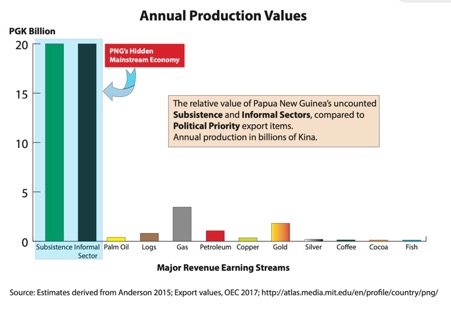Economic discussions in PNG are always centered on extractive industries such as natural gas, mining, logging, tuna, and large-scale agriculture. However, these export-orientated industries are tiny when compared to PNG’s real mainstream economy, “small farming”.

Studies into rural livelihoods over the past decade show that customary land is highly productive, but its output and impact are neither measured properly nor publicly recognized.
That affects how we see family income but also national income. It also impacts our government’s decision-making, our whole education system, and how we view development.
If a rural family had to buy at regional markets what comes from their gardens. They could have spent up to K20 000 per year.
That gives us an idea of the real value of subsistence output (what we produce to feed ourselves).
The value of domestic informal or market trading, including garden produce, is almost the same again, another K20 000 per year.
One million rural families could therefore be producing K40 billion in real value per year.
That, dwarves the annual combined output of Gold (1.7bn), Gas (1.69bn), Petroleum (1.63bn), Copper (0.75bn), Logging (0.8bn) and Palm Oil (0.47bn) which totals just K7bn.
That K40 billion value should be kept in mind when considering other economic activities that destroy or displace customary production, such as logging, oil palm or industrial sites.
We need to be much more mindful of what we stand to lose, in deciding whether change is justified or necessary.
EMPLOYMENT IN THE REAL ECONOMY
We also must be mindful of the employment that this real mainstream economy provides.
Over 6 million people in PNG work in their gardens everyday producing food and cash crops that nurture and sustain their families and communities.
Many economic surveys, especially those commissioned by banks, only measure ‘formal’ commence as this is what suits their interests.
They ignore subsistence production and housing and often also bypass informal trading.
When these are combined with small businesses, export crop and employment, rural family output can easily reach an equivalent value of K30 000 0r K40 000 per year.
When customary land is taken from families or clans there is a massive economic loss to those people and the nation.
There may also be losses in social value (reserve employment, food security and cultural value) and in ecological goods and services.
If we are to understand the real meaning of development and build a better future for all Papua New Guineans, we need to start by recognizing and then building and strengthening our real mainstream economy.
That must start with families and clans retaining control over customary land and end to land registration.
For more information check our website: www.actnowpng.org
